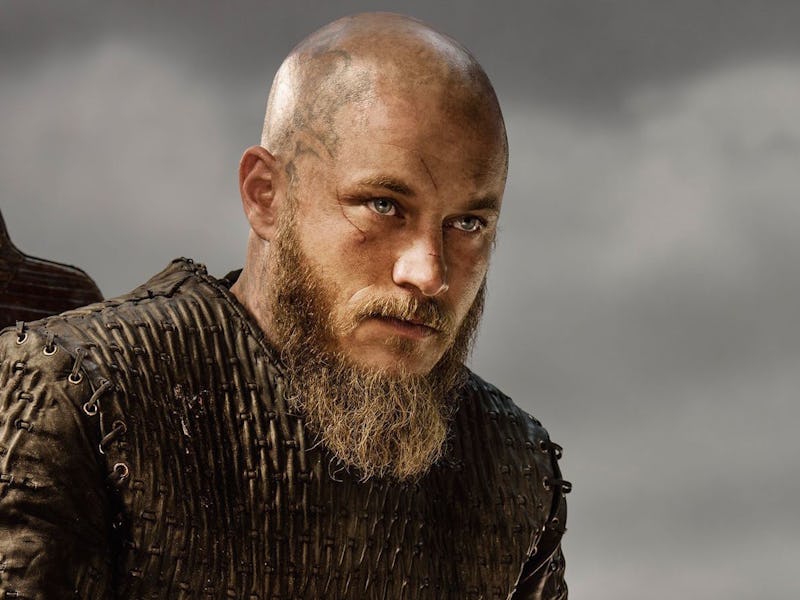Why 'Vikings' Kicks 'Thor''s Ass
The Marvel Machine has nothing on a network TV show.

History’s Vikings and the Thor movies deal with similar ingredients: Nordic mythology, battles, mysticism, and bearded men. Yet working from the same recipe, Thor arrives at an incoherent mess while Vikings achieves a not-even-all-that-guilty pleasure.
Now, you could attribute this to their mediums, as Vikings has more room to breathe on TV while the Thor films get only two hours, give or take a world-saving or two. But if anything, Marvel’s behemoth budget should allow it to be more impressive than a little network TV show, no? Instead, Vikings is the go-to for a fictional Nordic cultural fix. Movies lag even when they wield the might of Mjölnir. Taika Waititi would do well to pay attention, because this is how the History Channel is so far eating Marvel’s lunch.
Battles
The Thor movies take place on real Asgard while Vikings merely references it. You’d think, then, that battles among the gods would be more epic than paltry human skirmishes. You’d be wrong. In Thor: The Dark World the battles are a CGI fest, full of sound and fury, signifying nothing. There’s little tension because Thor obviously won’t die when several sequels are already on the calendar, and his enemy is a blandly evil alien god.
In contrast, the battles on Vikings are excitingly choreographed, brutal, visceral. They’re also utterly engaging and tense as hell because anyone can die at any time. They feel authentic; Thor’s feel manufactured. Not to mention, they have a killer soundtrack.
Psychobabble about gods and legacies
The Thor films and Vikings both feature a certain amount of mysticism, as is the custom when you dance in the realm between men and gods. Vikings makes the bridge between worlds appropriately ominous, with a 300-esque seer, vague prophecies, and dramatic lighting. The fact that he’s a crazy scary man in a hut only enriches the feeling of having one foot rooted in the earthly world and one foot rooted in another.
The Thor movies, in contrast, make world-breaching a joyless collection of technicolored swirls accompanied by visuals stolen from the Star Wars prequels. It’s suspended out of context, and the result is a scene that doesn’t feel tethered to any world. Further, it doesn’t explain much, so those who aren’t well versed in Norse mythology are left going, “Huh. OK, then.”
Look at their expressions in Thor. They don’t look like they’re witnessing a mystical event they deeply believe in; they look like bored uncles feigning interest in their niece’s piano recital.
Vikings shows how simpler is better. Though human sacrifice counters our own morals, in one of its most gorgeous and memorable sequences, the show brings us into a sacrificial ritual. Its silent depiction invites us to view it in a manner that’s allows us to see how sacred it is to the characters, even as it remains eerie and alien to us.
The scene is the same runtime as any minor Thor moment, and the character partaking in the sacrifice isn’t someone who has been developed over the course of several episodes. Yet the simple staging is far more effective in evoking awe and apprehension.
Women
Nordic Goddesses are boss bitches by default. Human women — especially in Viking society — are subservient to men, right? There should be no competition. And yet Thor’s Freya and Sif are given little more to do than wander around in the background being concerned about Thor. Don’t even get me started on how lame his love interest Jane is.
Lagertha, the main female character on Vikings, is human, but she’s more of a boss goddess than any of Thor’s actual goddesses.
You could argue that Sif fights alongside men, too, in the Thor films, but she’s firmly relegate to propping up Thor’s storyline and being a Strong Female Character suffering from Trinity Syndrome. Lagertha not only gets her own storylines, but she also gets to have a love life. In the world of Vikings, being a Strong Female Character doesn’t exclude having a softer side.
Vikings beats the Marvel Machine in ways large and small. It only goes to underscore, once more, how firmly television outclasses movies. If you find yourself intrigued by the Nordic pantheon, turn away from movies and look, instead, to Vikings or American Gods.